One digit on a single piece of paper separated Zee and his family from an uncertain fate. A month ago, the former Afghan interpreter escaped Kandahar, Afghanistan where the Taliban seized his home. They were looking for him, according to his brother who later sent him a video of several men loitering around his backyard. Zee dressed his family in worn and dirty clothes, hoping to disguise them as beggars, then boarded a bus with 50 other escapees at midnight. The bus headed toward Kabul and stopped six or seven times at Taliban checkpoints along the way. Zee said that armed men entered the bus and questioned the occupants: “What do you do? What was your job?” He sunk back into the seat with his family, hoping the disguises helped. No one questioned them.
He and his family made it to Kabul and hid only a few miles from Hamid Karzai International Airport before the last U.S. service member stepped onto a C-17 transport out of Afghanistan, officially ending the U.S. war in the country and signaling to Zee — and other Afghan allies — that escape may not come easily or at all.
“No evacuation, no visa, still stuck and trapped,” he said, allowing Task & Purpose to identify him only with a pseudonym in order to protect his identity.
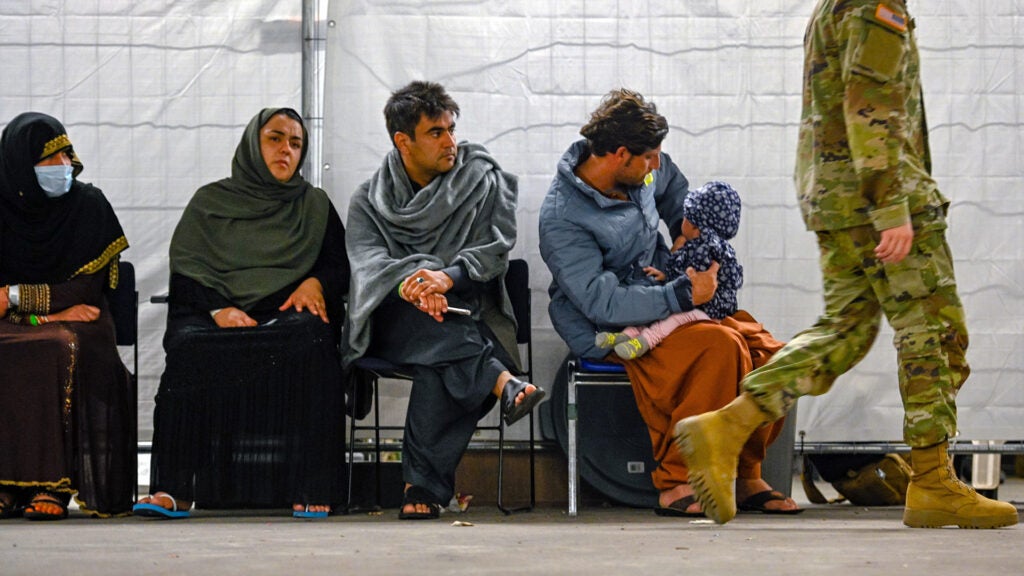
As he listened to the sporadic gunfire outside, he cursed the human resources officer who he said botched his paperwork. Specifically, verification of his employment with an American company called DynCorp that would help prove his loyalty to the United States, a State Department requirement for a special immigrant visa. “He left me and my family to the devils,” Zee said.
Zee is one of several former DynCorp contractors whose bid to obtain a U.S. visa has been hampered by discrepancies in human resources-related paperwork or communications, according to documents and correspondence obtained by Task & Purpose. As they and tens of thousands of other Afghan allies who worked for the U.S. try to escape the Taliban, they are also faced with another adversary: bureaucracy.
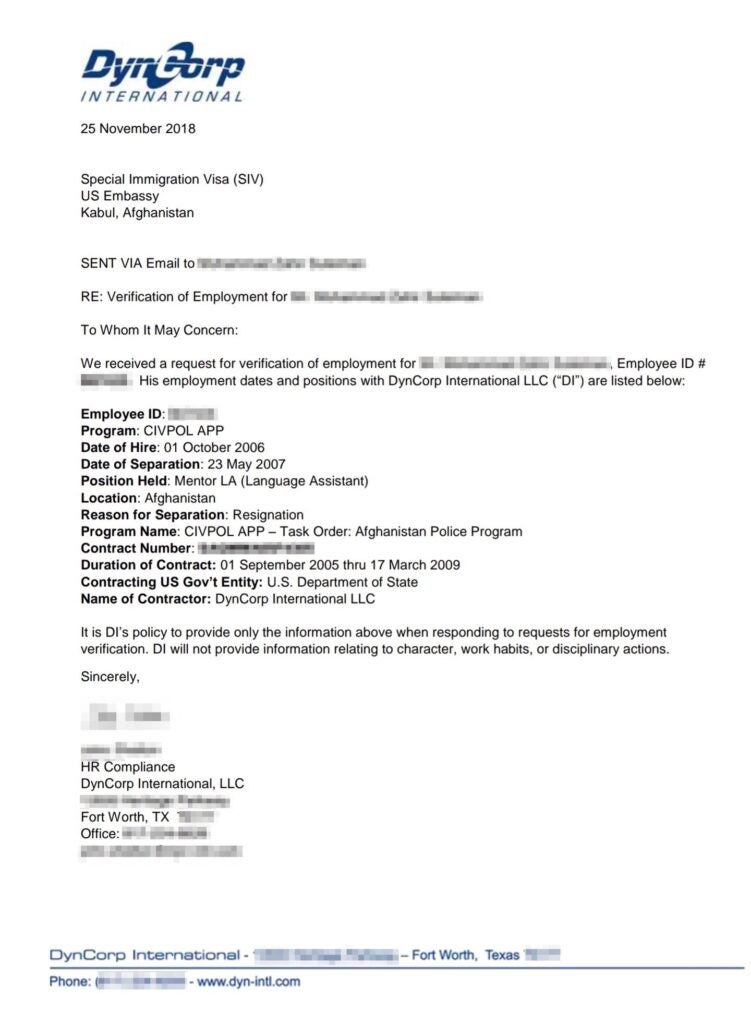
DynCorp, a private military contractor based in McLean, Virginia, carried out U.S. government contracts in Afghanistan “for governance and rule-of-law activities such training and equipping the Afghan National Police,” according to a Special Inspector General for Afghanistan Reconstruction report. Between 2002 and 2013, DynCorp received 69% of the State Department’s Afghan reconstruction budget, totaling $2.8 billion in contracts for that time period.
In 2020, Amentum, another private contractor, acquired DynCorp and the human resource responsibilities that came with it.
Task & Purpose sent Amentum a list of detailed questions starting on Aug. 16 about the several purported errors in their Afghan contractors’ paperwork. An Amentum spokesperson, Christine Fuentes, said the company is expediting requests for paperwork and are able to verify their contractors’ employment overall, but they would not comment on specific cases.
Fuentes declined to confirm if Amentum is able to specifically verify their Afghan contractors’ employment prior to Oct. 1, 2006, though — years after his initial request and with mounting pressure from his American allies over the last several months — the company issued Zee a correction with a 2004 start date.
Zee was a beneficiary of one of DynCorp’s early Afghan contracts and worked as a language assistant at Regional Training Center-Kandahar (RTC-K) from March 2004 to May 2007. There, he translated between American contractors and the Afghan National Police. Zee applied for a Special Immigrant Visa in 2018. He would then go on to translate for U.S. Special Forces in Afghanistan up until President Joe Biden announced troop withdrawals in April 2021.
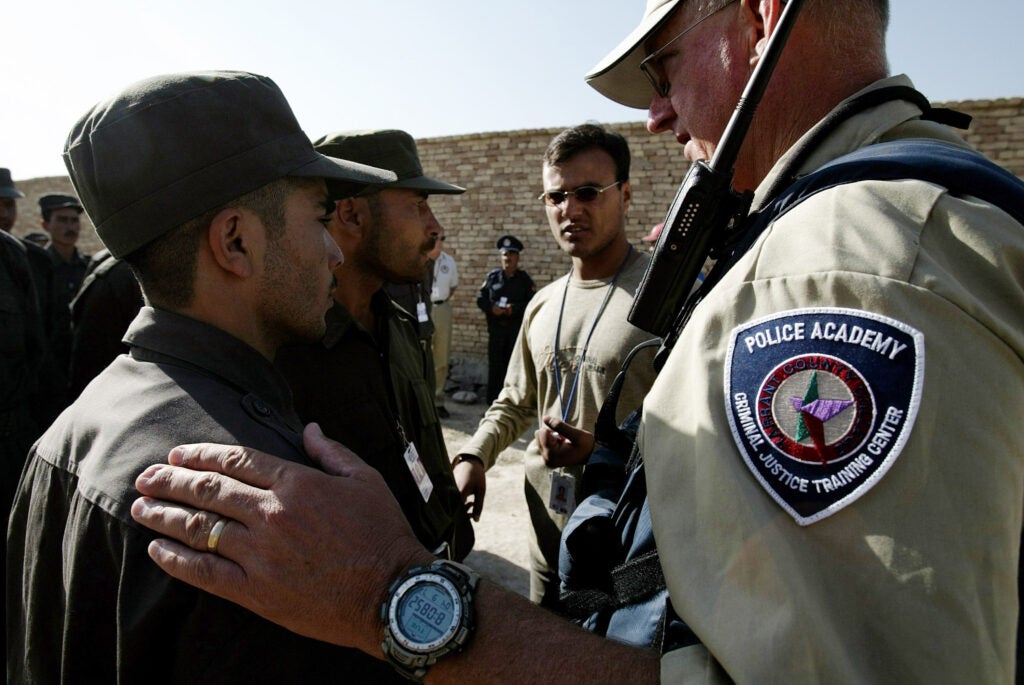
When Amentum sent Zee his employment verification form in Nov. 2018, he noticed something strange — a discrepancy. Amentum HR listed his start date as Oct. 1, 2006, making his service to the company less than a year, short of the two-year requirement for SIV applicants at the time and well short of the three years Zee actually worked for DynCorp.
Zee reached out to Amentum for a correction and provided the HR representative with DynCorp-affiliated documents such as certificates of appreciation and letters of recommendation from supervisors. Only a couple of documents in his first email to Amentum noted his start or end date, while others did not have a date at all.
One letter said Zee was a “trustworthy person and very dependable. [Zee] was always willing to do more than his actual job called for…if you need an excellent employee, look no further than [Zee].” The letter also placed Zee’s start with DynCorp in 2004. Still, the evidence presented was apparently not enough proof for DynCorp to correct his paperwork at the time.

“He told me that this is our last and final decision,” Zee said of the HR official. “We cannot process more than that because you are not in the system. I said, ‘I have certificates and recommendation letters, everything is written with the dates written on.’ But again I tried and tried, I sent many emails and he didn’t reply to me.”
After Amentum’s notice, Zee felt he had hit a wall, and that there was no other choice but to apply for a SIV despite the error. He was also confident in his employment timeline and thought the rest of his documentation would outweigh the discrepancy.
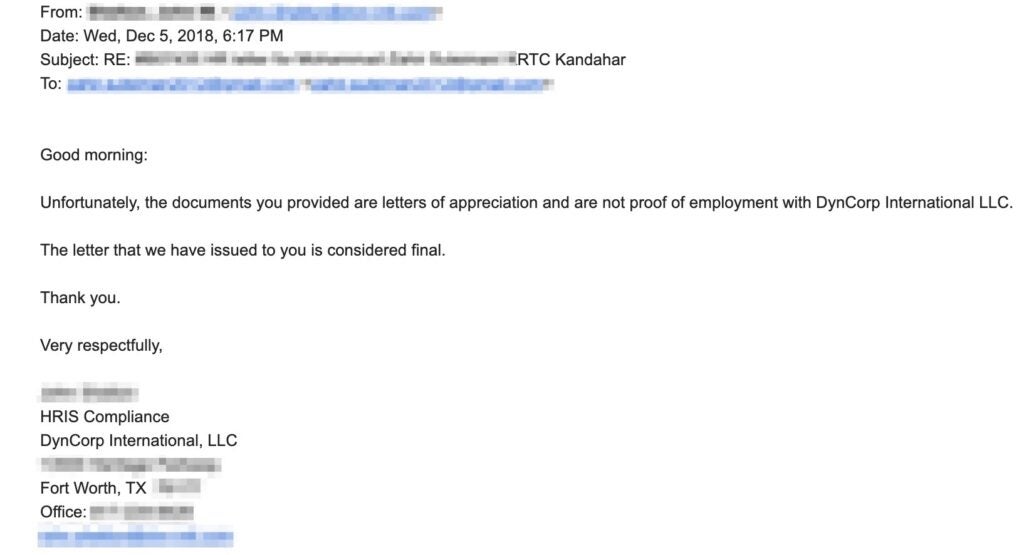
Two years later, in 2020, the U.S. Embassy notified him that his visa was denied. Zee had begun gathering documents from his Special Forces allies, but — with his original SIV processing time taking those two years — he had banked on the Amentum paperwork for his visa approval. Or rather, that their error would not thwart his efforts.
“I didn’t do anything wrong,” he said. “So why would you not give me just a simple letter to save my family?”
After the rejection, Zee asked Jimmy Allen Hill, Zee’s direct supervisor at RTC-K from 2005 to 2007, for help. Hill first reached out to Amentum HR in December 2020. He said he attempted to contact Amentum by phone at least 15 times and five or six times by email. “The only type of response I ever received was automated,” he said, adding later: “I also paid for LinkedIn Premium and my wife messaged their president, VP of HR and several others that were members of LinkedIn.”
On Aug. 16, 2021, eight months after Hill first reached out by email and just weeks before all American forces would leave the country, Amentum responded:
“Please complete the request form and provide your wet signature on the form. Use the same signature you used while signing DynCorp International LLC’s documents. Please include a copy of your passport or government-issued identification, 6 digits Employee ID or any proof of employment like the Offer Letter, Employment Agreement, or payslips. NOTE: Appreciation letters are not proof of employment.”
Hill responded, “Is this [an] automatic reply?? What does my employment verification have to do with anything? If you need it I can get it but if not I am not wasting my time. I am sick of getting no responses or what appears to be automatic replies… I get more frustrated by the day with Dyncorp…I am getting the feeling that you do not care about the truth or what happens to him and his family.”
Hill then sent Amentum additional documents — viewed by Task & Purpose — pictures of Zee and his family as well as gruesome images of what appeared to be the two people who fell from an Air Force C-17 transport attempting to escape the country in August.
He added: “If anything happens to them YOU are responsible due to YOUR inaction.”
Zee doesn’t appear to be the only Afghan contractor affected by errors in DynCorp or Amentum paperwork. As Task & Purpose reported in July, former Afghan interpreter Mirza Sayeed Nayab was denied a visa because his DynCorp supervisor did not list his employment end date on his recommendation letter to the National Visa Center (NVC). By the time that Nayab applied for a SIV in 2014, his supervisor no longer worked at DynCorp and he had no way of reaching him for a correction.

Despite Zee’s situation, he is trying to help others like him. As an interpreter, he understands that he has the communication skills to raise his concerns to his former employers, unlike the many security guards, hotel staff, and tradesmen that the United States also employed during the Afghan War who may not be fluent in English. He says that a friend from Kandahar, a plumber who only speaks Pashto, worked for DynCorp for 26 months, but his employee verification from DynCorp states he only worked there for five. Zee has been helping him gather documents such as bank records showing that the plumber received salary payments from DynCorp from at least July 2012 to October 2013 which — if recognized by Amentum — would make his one-year timeline eligible for a visa under the July 31 Emergency Security Supplementation Appropriation Act.
Faisal, another former contractor who agreed to speak under a pseudonym, worked for DynCorp as an interpreter from March 2006 to September 2007, a total of 18 months — which, when he applied for a SIV in 2013, would have qualified him for the one-year employment requirement at the time. He provided two letters of recommendation to confirm his service as well as Afghan Police Program certificates, though one letter of recommendation implies he may have worked there as early as 2005. Regardless, his employment verification letter from Amentum listed his start date as Oct. 1, 2006 — which cut his time down to 11 months.
Faisal said he received his denial letter in 2014, a year after he applied for the visa. “I applied with the documents received from DynCorp,” he said, “but my case was not approved.” The rejection was based on the fact that his DynCorp paperwork incorrectly showed he had not met the minimum employment term to qualify for a SIV, according to Faisal. However, he could not produce the rejection email. He was unsure where he saved the eight-year-old document and “got disappointed and had given up that case by that time.”
He said he secured employment at a different American company between 2016 and 2018, and with documentation from that job, was able to get approved for a SIV interview at the embassy.
??“Unfortunately,” he wrote to Amentum in August requesting a corrected document, concerned that he may be asked about the DynCorp start date discrepancy by a consular officer, “the US embassy is closed in Kabul now and I cannot have my interview.”
He added that the embassy issued him a temporary visa on Aug. 19, but he was unable to enter the Kabul airport due to the crowd.
DynCorp and Amentum listed Oct. 1, 2006, as a start date for at least four former Afghan contractors. The date is the first day of the federal fiscal year and is within 13 months of the State Department awarding DynCorp one of its first and largest Afghan contracts — $290 million to train civilian police (CIVPOL) in Afghanistan. The contractors worked under DynCorp’s police training program, specifically for the Afghan Police Program, on a “task order” that lasted from Sept. 1, 2005 to at least March 2009, though one Amentum employee verification letter has the order lasting until 2010. It remains unclear if the task order was part of the overall CIVPOL contract based on available evidence.
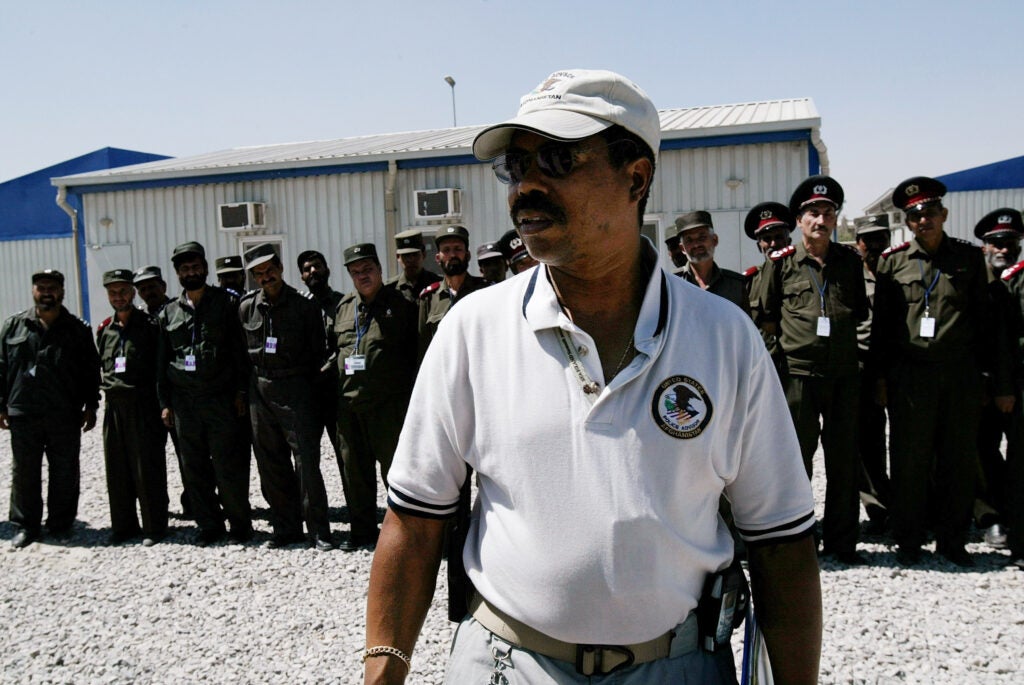
All four employees said they worked for DynCorp prior to Oct. 2006. They provided Task & Purpose varying degrees of evidence, such as identification cards, letters of recommendation with specific dates, personal recommendations, certificates of appreciation and grainy photographs. These documents, taken together for each of the four employees, directly conflict with the Amentum employee verification letters that are critical to getting their visa applications approved.
Christine Fuentes, an Amentum spokesperson, said the company was able to verify employment of Afghans who had worked for DynCorp, but when pressed on if Amentum could verify those employees prior to Oct. 1, 2006, Fuentes declined to answer.
Not all of the errors seemed related to the policing task order. Marz, who also agreed to speak under a pseudonym, has a particularly complicated case. He worked for DynCorp from April 2015 to August 2016 as an interpreter, but he received both an employment verification letter as well as a supervisor recommendation with a start date of 2014. Marz said the supervisor who wrote his recommendation letter got the incorrect start date from his verification letter, which placed a double error on his visa application. Despite adding a year of service to his individual contract, the document was at odds with the company’s overall contract and his visa was denied. The mismatched start dates in Marz’s visa paperwork seemingly caused the denial.
Marz fully acknowledges that he was not eligible for a visa when he applied in 2016 after working for DynCorp for less than two years and that his paperwork was incorrect. He said he applied anyway because the contract he was working on transferred to a different company and he thought that if he continued to work for another American company, it would be immaterial to the NVC. He also figured that by the time he would receive a response, he’d have his two years and the typo wouldn’t matter.
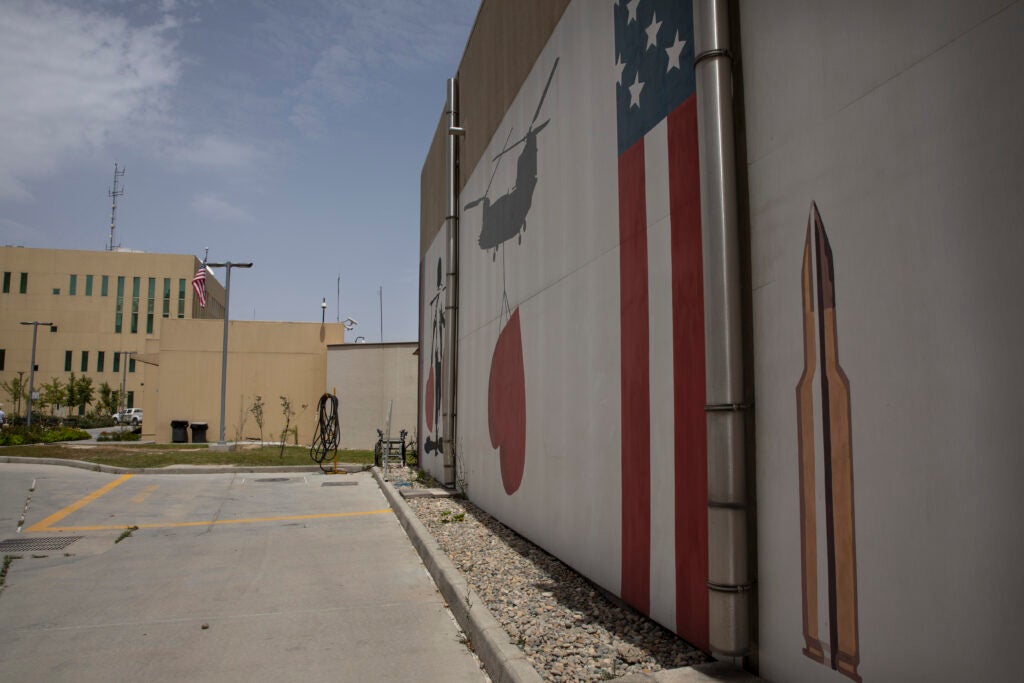
It apparently did matter.
Marz says that his visa has been denied three times and is currently back under review. He successfully requested a new employee verification letter from DynCorp with the correct start date, but he received it in 2018 — two years after he initially applied. While it is not immediately clear which of Marz’s applications caused the most damage to his reputation with the State Department, he received a letter from the U.S. Embassy in Kabul on June 10, 2020 notifying him that his documentation contained “derogatory information.”
“We have confirmed that the letter of employment you submitted with your previous application for Chief of Mission approval was fraudulent, which is incompatible with the standards for the Special Immigrant Visa Program,” the letter said. “You have failed to establish you meet the requirements of the Afghan Allies Protection Act.”
Like Zee, Marz called on his American supervisors for assistance. Cynthia Johnson, a former DynCorp security coordinator for the Afghan National Army in Kabul, was one of Marz’s direct supervisors and confirmed his length of service. She even continued to work with Marz when the DynCorp contract ran out in 2016 stating that she picked him for his great attitude and ability to speak English.
“Such a wonderful person,” Johnson told Task & Purpose. “I looked at him like a son.” She also wrote a letter last December attempting to explain the entire gum-up — that DynCorp had given him documents with an incorrect date, that he now has the correct documentation, and that she can vouch for him.
Marz recently received an email from a consular officer at the State Department notifying him that his SIV is back under review. At this point, Marz said he has worked for U.S. interests in Afghanistan for five years, but is back at square one.
Khalil Arab — who agreed to use his real name — settled in Houston, Texas in 2019 and considers himself lucky to have escaped Afghanistan despite also having clerical errors on his DynCorp paperwork. Arab said he worked for DynCorp as a plumber from 2005 to 2006. He then worked for them as an interpreter for the Afghan National Police in Herat from 2006 to 2007 until his contract ran out. He was eventually rehired by DynCorp until 2009, totaling his service to the company at about four years.
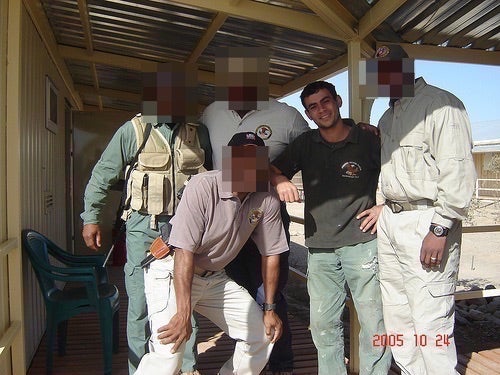
“There were people who actually got laid off,” he said, “and then they were not able to secure employment after that.” When DynCorp issued Arab’s employment verification in 2014, they listed his start date as — again — Oct. 1, 2006, not September 2005, his actual start date.
Arab provided four DynCorp supervisor letters of recommendation to Task & Purpose, including one with a September 2005 date. “Now imagine,” he said. “If I didn’t get rehired in March of 2007, I would never qualify for the SIV based on [DynCorp’s] employment records.”
“You could have thousands of different recommendations with a variety of different dates on there from a number of American citizens or any other international citizen,” he said. “But there’s two key documents that are taken into consideration for the SIV process. The letter of recommendation from your direct supervisor and the HR letter from the company or from the organization that you were involved with.”
Arab now works remotely for a private medical company in California, translating for Afghans who require medical advice, but who do not speak fluent English. He says he hears frustrations about the SIV process often, noting that some Afghan contractors have worked for several different supervisors over their tenure, requiring them to track down managers years later, often with limited success, he said.
“It’s just so wrong on so many different levels,” Arab said. “No matter how false that information is on that verification of employment coming from DynCorp, the SIV still accepts it and that’s really bothering me…SIV will take DynCorp’s word, not my word.”
One former Afghan DynCorp employee wanted to apply for a SIV, but said his supervisor was killed in Afghanistan in 2015, leaving him unsure of how to get a letter of recommendation. Some former contractors told Task & Purpose that they burned or destroyed their records for fear of Taliban retribution, pinning their hopes on their American employers for accurate paperwork.
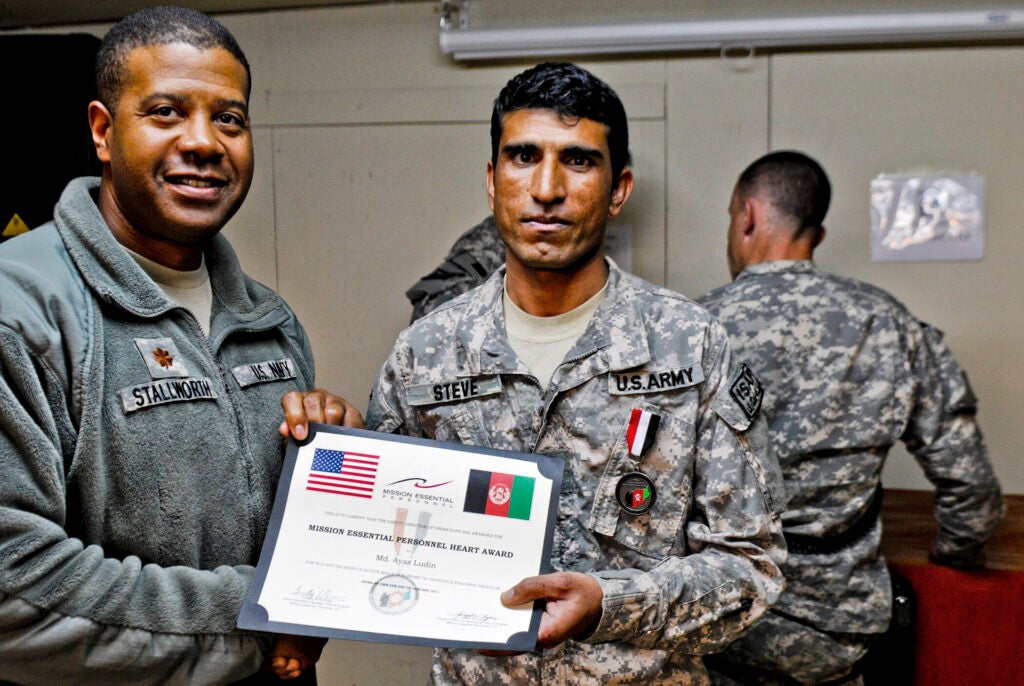
Nazir, another former employee of DynCorp who asked to be identified by a pseudonym, received an Amentum employment verification letter on Aug. 17, 2021. It also listed his start date as Oct. 1, 2006. He said he started at DynCorp in 2003, but only has one certificate of appreciation from 2005 showing that he worked at a Regional Training Center in western Afghanistan as a cleaner and a blurry picture of him from 2003 with no identifying DynCorp symbol shown in the image. The certificate of appreciation was signed by Ron Jones, whose almost-vacant LinkedIn page says that he worked as a site coordinator for DynCorp from 2004 to 2009.
Although Nazir said his Amentum HR letter is incorrect, it still shows over two years of employment history at DynCorp and therefore might not be fatal to his SIV bid. His issue was with the second visa requirement: the supervisor recommendation letter. Nazir said that he has worked for at least four DynCorp supervisors, all of whom he has lost contact with over the last two decades and was desperately poring over social media to find.
Like many Afghans in his situation, Nazir said he is desperate to find someone who can help him: “My friend called me today [and] said Talibans came to your home and asked about you and your family,” he said. “We are forgotten, we are hopeless,” he continued after hearing that a “majority” of Afghan refugees that the U.S. evacuated were not part of the SIV program, something he had seen while scrolling social media and was also reported by Politico.
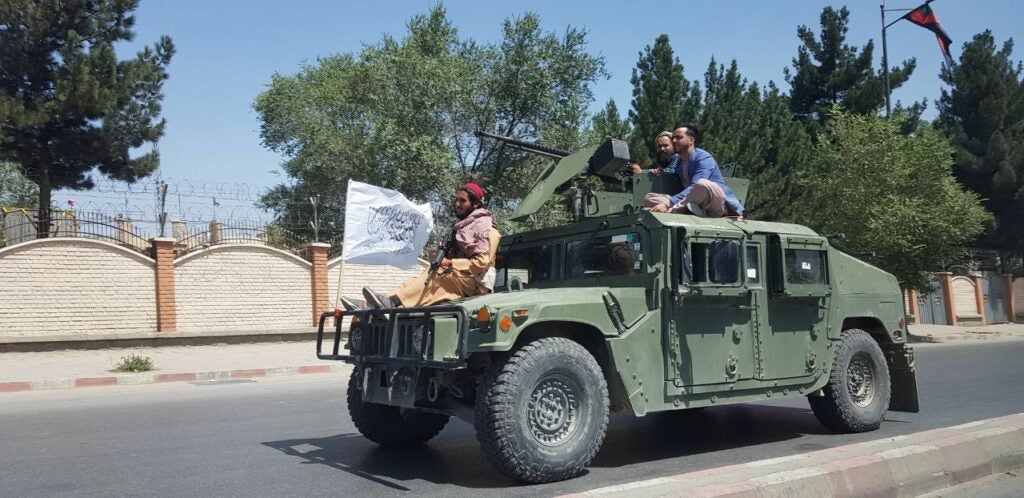
Nazir scoured Facebook and LinkedIn, attempting to contact supervisors who would be able to provide him a letter. One supervisor responded to Task & Purpose via LinkedIn and quickly signed his recommendation letter. Nazir then used it to submit a SIV case, he said. He intended to take a bus to Kabul hoping that having the required documents would ensure he’d get on a flight. But he could not rally his family in time for the U.S. withdrawal.
Task & Purpose asked Amentum if it could confirm its errors for these contractors and if there are any plans to rectify them. Fuentes declined to answer specific questions, but provided this statement:
“We understand the urgency and sensitivity surrounding the Special Immigrant Visa application process that is ongoing in Afghanistan. Amentum is expediting the processing of all employment verifications in support of visa applications. We also appreciate the complexity of the many individual cases – including those who were employed by subcontractors. While it is our policy not to discuss any specific application due to privacy and security concerns, we remain committed to fully supporting our partners at the Department of Defense and Department of State in order to verify the employment of individuals applying for the visa. We will continue to follow their procedures and established processes, and will continue to respond promptly to all requests we receive for the duration of the effort.”
While Fuentes confirmed Amentum’s corporate commitment to the State Department’s verification process, communication between the two entities, as well as their subcontractors, is confusing, especially for Afghans trying to navigate the bureaucracy associated with them.
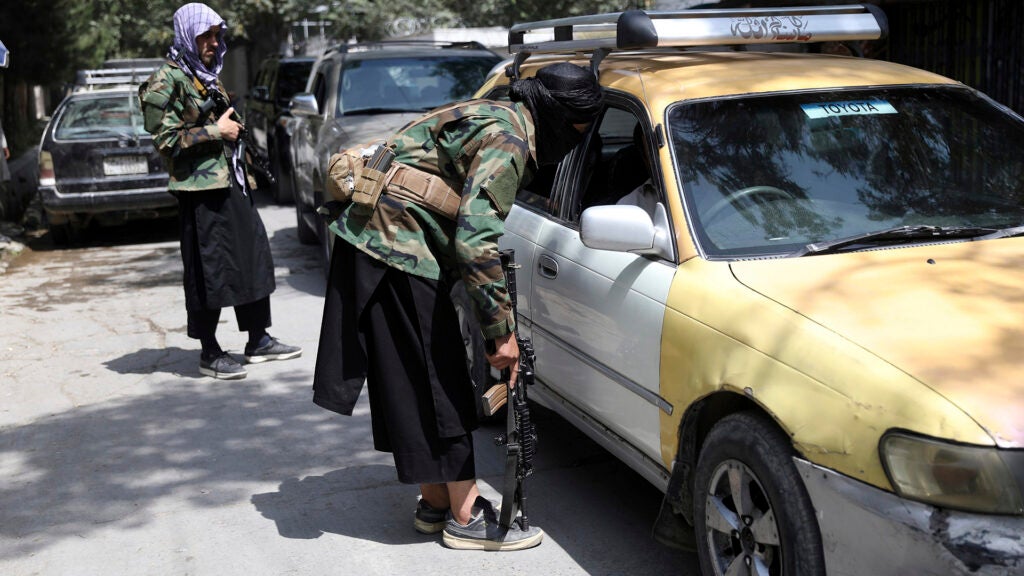
Abe, who also agreed to speak under a pseudonym, worked for a Dyncorp subcontractor called Vekti, an Afghan company that specializes in software development, database analytics, and identification card processing. Abe was able to receive employment verification from both Vekti and DynCorp — with correct dates listing his employment from August 2017 to February 2018. Although his employment was under two years, Abe worked for another U.S. company for 21 months, so when he applied for a visa in 2019, he only needed to confirm his six-month employment with DynCorp to push him over the two-year requirement for a green card.
But in March 2021, the U.S. Embassy in Kabul notified him of his denial. They could not confirm the contract between Vekti and DynCorp. His letter read:
“You submitted a number for a contract held by your first employer with the U.S. government, but that contract information was for a period of performance of less than your employment period. Additionally, your second employer did not provide evidence of a subcontract with the U.S. government to cover your six-month performance.
“If you wish to appeal, submit evidence that you were employed under a qualifying contract, including either a copy of the contract or the name of the project, contract number, the dates you were employed under this contract, and the duration of the contract. If you were employed under a subcontract, we recommend providing a copy of the contract between your employer and the prime contractor.”
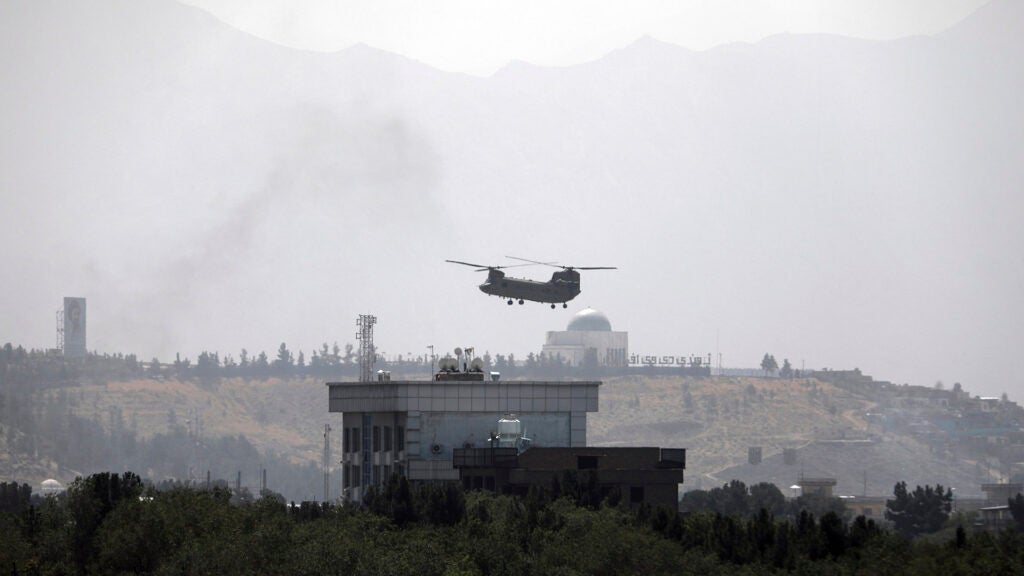
Abe contacted an Amentum representative and requested a copy of the contract between DynCorp and Vekti: “I must submit the copy of the contract between my employer which is the sub-contractor (vekti) and prime contractor (DynCorp), as stated in the attached email from NVC,” he wrote. “For this reason, I am kindly requesting for your help, in a result of which you will save me and my family from being killed. I generously request if you could provide me with a copy of the contract between VEKTI and Dyncorps.”
The Amentum representative asked Abe to contact Vekti first. Abe confirmed that he already had and that Vekti’s reply was “negative and they told me that they will only provide it to the embassy.” But when the embassy contacted them, “they didn’t provide anything,” he said, adding that Vekti also told him that the contract was confidential and could not be shared with him directly.
The Amentum representative replied: “I have not been contacted by the SIV Team concerning your case. When they contact me, I will verify your contract.”
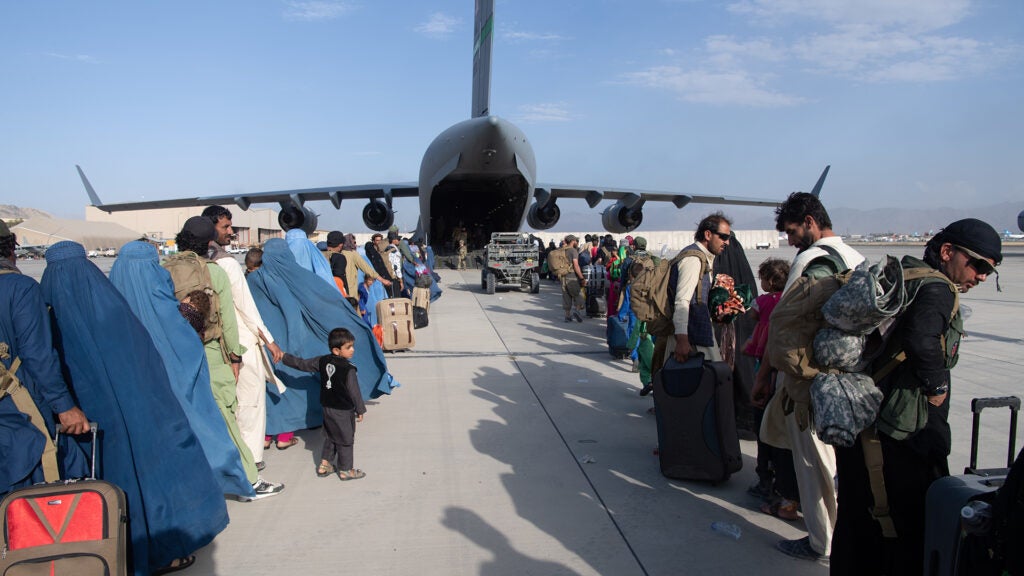
Frustrated, but maintaining a professional demeanor, Abe replied: “Sir, Apologies for the inconvenience. The SIV Team have not contacted you. They have only contacted Vekti office management, but they have not provided any information to them. That’s why I wrote to you, and asked for your help.”
The Amentum representative’s latest message read: “[Abe], please have them contact me for verification.”
The back and forth illustrates the complex nature of navigating the SIV program. Both Amentum and Vekti initially complied with the State Department’s request for a contract number, project name or date range when they listed it on Abe’s employment verification — though, according to the State Department’s denial letter — it was not enough to verify his subcontract. From Abe’s emails, it seems as though Vekti at least communicated with the State Department after the denial, but it is unclear what type of communication occurred. The Amentum representative also suggested he would communicate with the embassy if and when they reached out.
Abe felt the only way to prove his employment quickly and beyond a doubt was to provide the State Department with the actual contract, which they also asked for in the letter and which neither Vekti nor Amentum would supply to him.

Another prior Vekti contractor also reached out to Task & Purpose regarding his former employer. He provided a list of over 90 names, almost all with associated Tazkira numbers (Afghan national identification numbers) and contract dates that lined up with Vekti’s Afghanistan Police ID Card / In and Out Project — a DynCorp subcontracted program to supply identification cards to the Afghan National Police, according to government spending data and a 2016 SIGAR audit.
When asked if Amentum could verify any of the employees on the list, Fuentes said it could not and that Amentum “does not have access to our subcontractors’ databases to verify the records of those who were employees of these companies.” She then referred questions to the Vekti CEO.
Vekti CEO and President, Abdul Majid Zikria, confirmed his company’s employment to DynCorp and described the hectic push for records from his former employees. He would not provide Task & Purpose with the contract between Vekti and DynCorp for “proprietary reasons.”
Zikria said that, despite Vekti having conducted no business since 2018, he has kept one human resources officer on the books to process these requests. The HR officer is also personally trying to escape Afghanistan while attempting to process records based on names, ID numbers and start and end dates compiled on an Excel spreadsheet. At least 430 employees worked for Vekti under the DynCorp contract, according to Zikria.

“We’re bombarded with HR letter requests,” he said. “There’s a lot of fraud going on. There’s a lot of people, they want us to change the dates and this and that. And they cuss us and they curse us and they threaten us.”
“I mean, we’re under severe pressure.”
When asked if Amentum has helped him process these requests, he said, “this has nothing to do with DynCorp [now Amentum], these are my employees.”
“I hope [my employee] escapes soon because he is under severe threat right now,” he said, stating that a Taliban commander called his employee based on information obtained from one of the Vekti HR letters. “So right now he’s in hiding. He can’t even go to the airport. He went there and waited eight hours and he has a young child, but he couldn’t get out.”
He also said that in order to protect the identities of his former employees from the Taliban, he compiled their information into Excel spreadsheets and destroyed their physical employee records. Out of the list of over 90 former employees sent to Task & Purpose, he said he had already issued an HR letter to half of them and was able to verify the former employment of the other half except for “one or two.”
He added: “Please be reminded that every employee that ever worked for us upon separation or end of project received an HR letter. But these people want HR letters specific for SIV applications which is a different format.”
On Aug. 16, Amentum released a statement on Twitter and their website asking Afghans employed by “legacy companies” with requests to send an email. Fuentes later stated that the Task & Purpose inquiry had nothing to do with the messaging and that the effort was ongoing prior to the questions being sent.
Four days later, after almost three years of requests for information from Zee and at least six months from his allies, Amentum sent him a corrected employee verification letter. The initial relief from the correction was immediately replaced with frustration and dread by Zee’s American advocates.
“Getting him his visa and getting him to the airport on a flight is the goal,” said Hill, Zee’s former supervisor in Kandahar. “Simply providing them documents and saying get here on your own isn’t going to be feasible at this time.”

Cress Clippard, a former Marine and community leader for a non-profit that focuses on SIV support, said Zee and his family should have been able to leave Afghanistan a long time ago.
“It would be one thing if DynCorp had only made a mistake,” he said, adding that he and at least one other American had made several attempts to contact the company. “I hope [Zee] and his family are able to make it out. I hope DynCorp’s error doesn’t cost them their lives.”
For Zee, the corrections simply came as a bitter confirmation of the road ahead. After spending almost a month trying to get a flight out of Kabul, Zee ran out of money and had to take another treacherous bus ride to hide with relatives south of the city. He sent two pictures of himself over WhatsApp. One from June and the other from August.
“See the difference between [two] months?” The picture from July showed Zee sitting in a cafe, his arm confidently laid across the chair he was sitting on. His legs were crossed as he stared into the camera. He looked calm.
The later picture shows a close-up of his face. His beard is longer and scruffy, his eyes red from days of crying and worry. “I lost my house, my home items, everything. My car — everything was looted and I escaped to Kabul with nothing.”
Zee’s sentiments echoed those of many Afghan contractors who are wading through paperwork in an attempt to escape the country. “If [Amentum representatives] replied on time, I would not lose my property,” he said. “I have to wait again for [the] U.S. Embassy. I don’t know how long it will take to hear from them too.”
Unlike Zee, Arab — the medical translator in Texas who made it to the U.S. despite errors on his own DynCorp paperwork — watches these cases from a safe distance. But he watches with a restless perspective, one soaked in a disquieting combination of guilt and helplessness. He is lucky, he admits, but torn and angry as he hears about his fellow Afghans and their struggles.
“Twenty years of bloodshed. Twenty years of taxpayer money,” Arab said. “It was all for nothing … we have thousands and thousands and thousands of desperate people, gasping for air, they’re just trying to get to safety. Do I ever regret my part? Never ever, because I didn’t do anything wrong…but if I go back in time, 15 years, 16 years, or 20 years, would I make the same decision?
“No. No way I would have made the same decision again, no way would I make the same mistake again.”
+++
Drew F. Lawrence is an Army veteran and operations manager for Military Veterans in Journalism, a non-profit connecting military veterans to newsrooms. He graduated from The George Washington University School of Media and Public Affairs.
